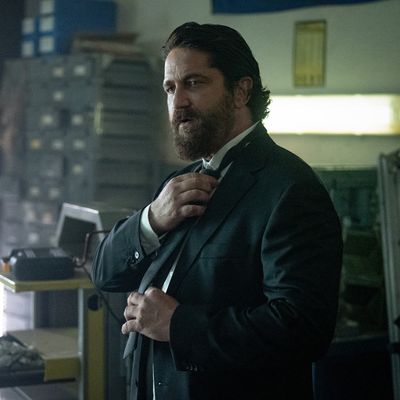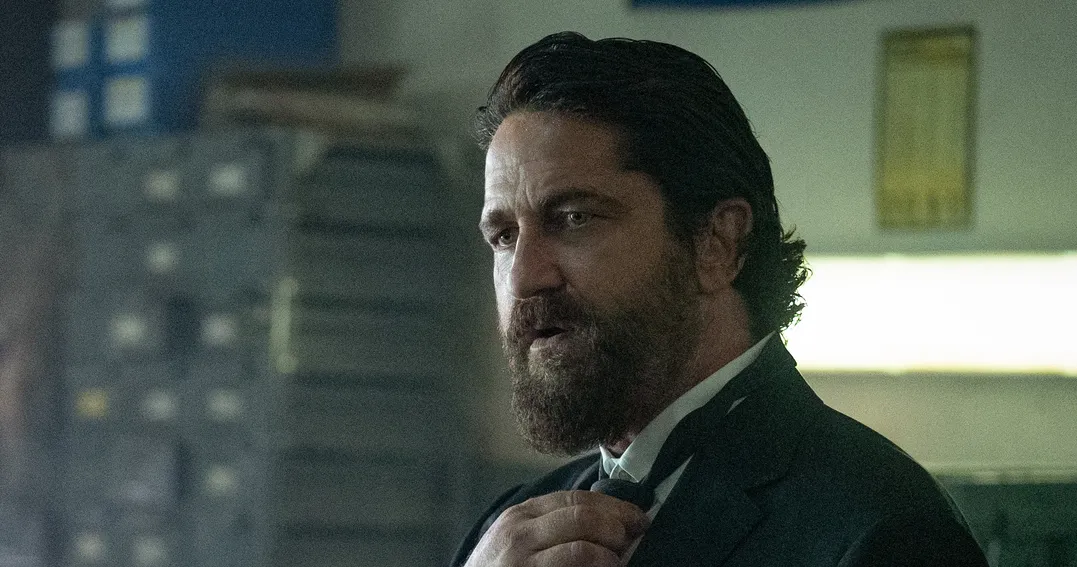
If the first Den of Thieves was a meathead remake of Heat, the sequel feels like a meathead remake of Miami Vice. Photo: Rico Torres/Lionsgate
If 2018’s Den of Thieves played like a meathead remake of Michael Mann’s Heat (1995), then the new Den of Thieves 2: Pantera plays like a meathead remake of Michael Mann’s Miami Vice (2006). Neither of these are bad things. Gone is the attention to process and scuzzy detail that made the first film notable, replaced here by a wild, drunken emotional energy that dispenses with story logic and clarity. That also makes it a fine showcase for star Gerard Butler, who has been for some years our most begrimed star — a man whose persona is manliness and brokenness in equal measure, a man who makes you wonder if manliness and brokenness might not in fact be the same thing.
Butler reprises his role as “Big Nick” O’Brien, a Los Angeles Major Crimes Unit detective who found himself outwitted at the end of Den of Thieves by bartender and getaway driver Donnie Wilson (O’Shea Jackson Jr.), who was revealed to have masterminded that film’s Federal Reserve robbery.
The crooks’ scheme there was particularly clever: It involved a plan to steal the enormous piles of money the Fed shreds every day. As a result, there is no record of anyone having lost any money — all that cash had been pulled out of circulation, so on paper, nothing is missing and nobody has been robbed, and the Fed doesn’t want it out there that it’s been successfully hit by thieves. But Big Nick, who has just gone through a messy divorce (he’s incapable of doing anything unmessy), can’t let it go. He travels to Europe and finds Donnie, who is now working with the Panthers, a gang of Eastern European criminals scoping out a major diamond heist along the Côte d’Azur. Nick’s life has fallen apart, and it seems he’s interested in something other than catching Donnie: He wants to join him.
I’m not quite sure what happened after that. My notes say, “Gerard Butler eating a steak,” “Gerard Butler drinking,” “Gerard Butler falls off small scooter,” “giant dudes eating tiny ice creams,” “cool cars,” and “Italians?” Much like Den of Thieves, Pantera gets some mileage out of not quite letting us onto what the criminals are planning: We see bits and pieces of their preparation, but part of the charm of these pictures lies in revealing the big heists as they happen onscreen. And Pantera has less exposition than most heist flicks, which gives it an extra frisson of pleasant incoherence. Director Christian Gudegast lends the European locales elegance and anticipation, as his images play out against beds of shimmering electronica. Between all the shifting loyalties and the not-unconfusing shots of criminals watching other criminals, we feel distinctly unmoored, like we’ve landed on a strange, wonderful planet where everybody’s a crook.
That’s the real story here. In Pantera, the cops-and-robbers story matters a lot less than Nick’s intoxication with the wild, hedonistic life of a criminal and his growing bond with Donnie. Butler’s eyes go delightfully wide as he steps into open air discos, smokes hash, and downs shot after shot of slivovitz. Gulping late-night shawarmas, he and Donnie trade stories about how they fell into their respective careers as cop and robber. On paper, this might read as standard-issue character development, but the two actors beautifully sell their growing ease around one another. We want to luxuriate in this world, the same way Nick does.
Pantera belongs in that long line of sequels that seem to lose patience with simply replicating an earlier film’s dynamics and opt instead to just let us bask in freewheeling character interactions. These pictures sometimes get dinged by initial audiences — think Ocean’s 12, or 2 Fast 2 Furious, or even Mission: Impossible 2, which made loads of money but forever earned fans’ ire — but eventually find some sort of acceptance. The first Den of Thieves was itself not that big a hit; it’s become retrospectively beloved in the ensuing years as viewers have embraced its old-school crime-thriller charms. And Butler has admirably made a career out of keeping this type of movie alive, playing ordinary, often relatable men thrown into extraordinary circumstances. In that light, the new film’s change of locale and tone make perfect sense. Watching Big Nick get a little lost in a boozy dream of abandon, an ocean away from his troubles, we understand him better than we understand most of today’s movie heroes.


